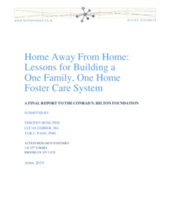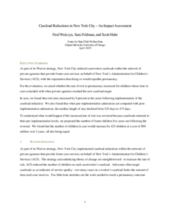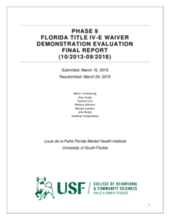Displaying 141 - 150 of 437
This study sought to determine whether the Parent Support Outreach (PSO) program, an early Child Protective Services (CPS) response and service model to screened-out reports and other high-risk families in Minnesota's child welfare system, resulted in less subsequent CPS involvement, increased use of mental health and substance abuse services, and improvement of family's economic well-being.
This report describes lessons learned from a centerpiece of Home Away From Home: coaching, technical assistance, and data analysis activities aimed to improve the recruitment, training, support and retention of foster homes and build kinship caregiving capacity.
This webinar offers foundational information related to the intersection of culture, the migration journey, trauma and assessment.
For this evaluation, the authors asked whether the rate of exit to permanency increased for children whose time in foster care in New York City coincided with when private foster care agencies reached the new reduced caseload target.
This report presents findings from an implementation analysis aimed at describing implementation of the U.S. state of Florida Title IV-E Demonstration Project, which allowed the state to use certain federal funds more flexibly, for services other than room and board expenses for children served in out-of-home care.
As technology enhancements effectively augment family-based interventions, the purpose of this study was to pilot a smartphone application (app) in the context of a trauma and behavior management-informed training for foster and kinship caregivers.
This study has three aims: (1) to provide an overview of a module designed to support relationship building between LGBTQ+ youth in foster care and their caregivers, (2) to describe the theater testing procedure used to assess usability of the developed module with foster caregivers and adults, and (3) to share the results of the theater test.
To explore the viability of positive youth development for youth in care, this observational study investigated whether participation in a summer camp-based reunification program for siblings separated by foster care in the US and Australia called Camp To Belong influenced youth resilience, a critical protective mechanism for maltreated youth.
This study examined the effectiveness of solution-focused brief therapy (SFBT) on child well-being and family functioning outcomes for child welfare involved parents.
This research addresses one of the most pressing and controversial issues facing child welfare policymakers and practitioners today: the dramatic overrepresentation of Indigenous families in North American public child welfare systems. The article presents a successful model of inclusive education: the Center for Regional and Tribal Child Welfare Studies (the Center) at the University of Minnesota, Duluth, School of Social Work.



